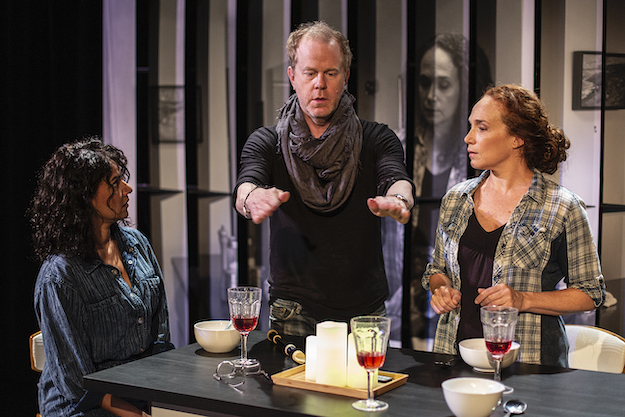
Stylistic inconsistencies plague Body Awareness. (Photo of Suleka Mathew, John Murphy, and Jennifer Copping)
What country, friends, is this? For about the first three-quarters of Body Awareness, I had no idea where I was.
I mean, I knew the literal location. In Annie Baker’s script, a couple named Joyce and Phyllis, are living with Joyce’s 21-year-old son Jared in a Vermont college town called Shirley.
Joyce teaches high school, Phyllis is a psychology prof, and Jared is neurologically atypical. Joyce and Phyllis think Jared has Asperger’s and have given him a book on the subject, hoping that he will consent to diagnosis and treatment. But Jared is wounded: “I’m not a retard!”, he insists almost as often as he boasts, “I’m an autodidact.”
Then a photographer named Frank arrives to destabilize this family even further. Phyllis is organizing a campus event called Body Awareness Week and she has invited Frank to show his pictures. She has also invited him to stay in their house.
But the holes in this set-up are so big they could swallow worlds.
Jared’s temper is violent. Furious with his mother, he threatens, “I could garrotte you both in your sleep.” And yet, Joyce, a teacher, and Phyllis, a psych prof, have never had him diagnosed. In what country?
And Phyllis is outraged when she discovers that Frank’s photos are of female nudes — from prepubescent girls to old women. She bristles about the male gaze. But Phyllis has organized Body Awareness Week for fuck’s sake. Why hasn’t she reviewed Frank’s work?
There’s another soft spot: Joyce is the play’s protagonist — and its least interesting character.
Body Awareness is about the challenges of empathy. Jared’s struggle with the theory of mind is neon-lit. And Phyllis and Frank both have colourful relationships to it.
The minute Frank enters, he establishes himself as a condescending asshole: “You live here. That’s so strange … People in towns like this always seem to find my work threatening.” But Frank also listens. In its balance of eccentricity and authenticity, the scene in which Frank gives Jared sincere, though flawed romantic advice is the best in this production. And it contains the script’s most hilariously transgressive line: “You’re not retarded,” he reassures Jared. “You just live with two women.”
Phyllis embodies the other side of the equation: an ideologically driven feminist who rails against Frank’s photographs without having seen it. But, like Frank, Phyllis is also capable of tenderness.
Joyce, on the other hand, muddles through the middle, hoping everybody will get along. She doesn’t struggle with empathy; she is empathetic so, mostly, she’s confused. And, in this theatrical set-up, that means that she gets upstaged.
Aaron Craven’s casting and direction magnify the script’s problems: almost all of the actors occupy separate stylistic worlds.
Suleka Mathew’s world is wobbly. On opening night, she seemed to be stumbling over her lines and her rhythms were jagged. Mathew isn’t bringing the blinkered self-certainty or the comic spin that would make her Frank’s foil.
John Murphy, on the other hand, knows exactly how to extract the comedy from Frank’s self-regard and blend it into eccentric tenderness. But Murphy may be having slightly too good a time; for this production to be stylistically consistent, either he would have to dial down the parody, or Jennifer Copping would have to find some effective exaggeration in Joyce.
Copping delivers a consistently naturalistic performance — there’s always something going on behind her eyes — but, when she’s talking to Frank and he’s in pompous mode, they’re far enough apart stylistically that it doesn’t feel like they’re in the same house.
That’s not the case, though, with the sex-advice scene that I referred to earlier. Murphy and Zac Scott, who’s playing Jared, both understand the extreme outlines of their characters and both know how to inhabit their characters’ softness. In this production, this is the scene in which the play’s voice is clearest and it’s the scene that allowed me, at long last, to drop into Body Awareness.
Once I was there, I had a good time; I just with the production had invited me earlier.
That said, David Roberts’s set is inviting from the get-go. The script requires two playing areas: Joyce and Phyllis’s bedroom and their kitchen. Riffing on Frank’s profession, Roberts renders the back walls of both areas as black-and-white photographs. So, when Joyce and Phyllis lie in their bed, they’re lying in front of a picture of themselves lying in bed. I suppose you could say that this prompts a dialogue between the static and the lived, between abstraction and experience. But why get heady? It just looks incredibly cool and the walls are vertically louvered, which makes them even cooler.
In Body Awareness, which opened off-Broadway in 2008, Baker’s quirky humanism hasn’t quite found mature expression. But that expression is ripe in The Aliens (2010) and The Flick (2013). Both of those plays are, without exaggeration, masterpieces — and Body Awareness gives them developmental context.
BODY AWARENESS By Annie Baker. Directed by Aaron Craven. Presented by Mitch and Murray Productions at Studio 16 on Friday, October 11. Continues until October 20. Tickets.
NEVER MISS A REVIEW: To get links to my reviews plus the best of international theatre coverage, sign up for FRESH SHEET, my free weekly e-newsletter.
And, if you want to keep independent criticism alive in Vancouver, check out my Patreon page. Newspapers are dying and arts journalism is often the first thing they cut. Fight back!





0 Comments